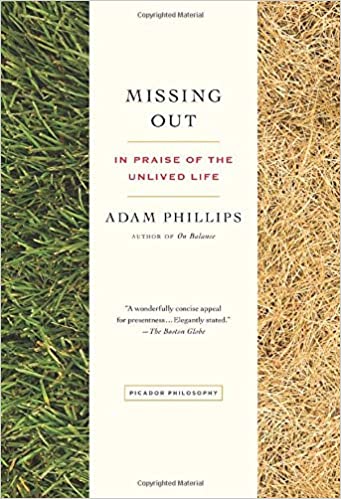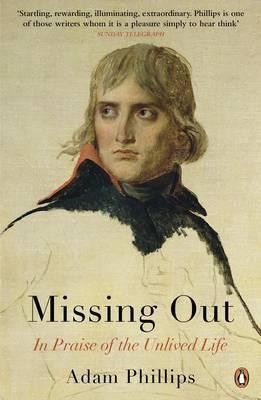If you are interested in discussing the book, Missing Out, by Adam Phillips, and if you’re free this weekend, consider joining our online book club discussion (here is the link for more information).
Adam Phillips is a practicing psychoanalyst and has written and co-written many books (including On Balance, Becoming Freud, Unforbidden Pleasures, and the forthcoming The Cure of Psychoanalysis). Missing Out: In Praise of the Unlived Life (2012) is the first book I have read by him, and I have found it very impressive. As the title suggests, the book is concerned with that side of life we often recognize as unlived: the paths not taken, missed opportunities, the potentials that haven’t and will not become actual. This idea applies to a wide range of situations, including the relatively mundane (e.g., missing out the fun at the party you couldn’t attend) and the more serious and tragic situations (e.g., the thought that one might be missing out the life experience of a “normal”, “sane”, “successful”, or “respected” member of a society). The relevance of the topic shouldn’t deceive us into thinking that the book is easy to read or that it contains a set of practical tips on how to deal with the feeling of missing out. This isn’t a “self-help” book (which isn’t to say it won’t be helpful). What Phillips offers us is an exploration of several interrelated themes. The result of his exploration is a richer (fuller) view of human experience. In particular, his exploration illuminates what it means to be a grown-up, a responsible adult, someone who is interested in (contact with) reality, including the reality of other people, and the reality that is reflected in our own feelings. He also offers an understanding of some aspects of contemporary culture, which urges us to live paradoxical lives and constantly seek win-win, sacrifice-free decisions, to never miss out on anything. Isn’t it true that our contemporary culture, our style of imagining and reasoning about our lives, has made a taboo out of missing out?
The book is divided into a prologue, five main chapters, and an appendix. The main chapters are titled, (1) On Frustration, (2) On Not Getting It, (3) On Getting Away with It, (4) On Getting Out of It, and (5) On Satisfaction. Considering frustration, Phillips invites us to see how this feeling isn’t just a demand for what we lack, but results from knowledge and (tacit) decisions. It arises from the way we have settled matters for ourselves: That person frustrates me! She could give me what I need, but she is choosing not to! This situation frustrates me. It can and should work out for me, but it’s not! If I am frustrated by my friend, that implies that I am confident about what my friend can do for me. Maybe I’ll be lead into believing that my friend is choosing to frustrate me. Phillips reminds us: “Only someone who gives you satisfaction can give you frustration.” After reading his treatment, we are reminded that there is always more to frustrations than what appears to us at first, and that frustration is unavoidable in so far as we must live in the real world, i.e., outside of our fantasies.
Not getting it, the topic of the second chapter, explores the reasons why we want (and need) to “get it” (get what someone means, get the meaning of a situation, get the joke, get the poem, and so forth), and why we might consider living a life in which not getting it can also, at least some of the times, become an aim. In connection to this idea, Phillips brings in Freud and psychoanalysis, as a liberating project.
Psychoanalysis is, in fact, the treatment that weans people from their compulsion to understand and be understood; it is an “after-education” in not getting it. Through understanding to the limits of understanding — this is Freud’s new version of an old project. Freud’s work is best read as a long elegy for the intelligibility of our lives. We makes sense of our lives in order to be free not to have to make sense.
from On Not Getting It
In the third chapter, On Getting Away with It, we read about the new morality of our age, according to which we aren’t supposed to take the type of responsibility that challenges the rules overtly, while also avoiding the type of responsibility that follows the rules. We are encouraged to constantly find loopholes, to have our cakes and eat them, too, to find how we could make an exception of ourselves. The fourth chapter, On Getting Out of It, introduces us to a way of thinking, and a way of reading literature, that aims at getting out (a method for actively missing out on what we hate; cf. “lines of flight” in Deleuze & Guattari). A related, and very interesting, line of thought in this chapter is about how confident we often feel about knowing what we is beyond our experience:
… sometimes–perhaps more often than note–we think we know more about the experiences we don’t have than about the experiences that we do have, ‘frustration’ being our word for the experience of not having an experience. I am struck, for example, by how much people talk in psychoanalytic treatment about the experiences they have not had in the experiences that they have had; and how authoritatively, with what passion and conviction, they talk about what they have missed out on.
from On Getting Out of It
You might expect Phillips, being a psychoanalyst, to use examples from his case studies (people who come to him for analysis), but he almost uses no examples from his experience as an analyst. That might be because he positions himself primarily as the analysand. I am inclined toward this way of thinking about his writing, based on his free-associative style, and the way he follows images and literary fragments. The examples in the book are mostly from literature, and those are mostly from Shakespeare. So if you enjoy thinking about Shakespeare’s plays and if you enjoy reading commentaries (and commentaries on commentaries) about Shakespeare, especially from a psychoanalytic perspective, you’ll enjoy this book. The appendix (“On Acting Madness”, based on a lecture Phillips gave about theatre at the Brooklyn Academy of Music) can be read before or after the rest of the book. This essay is a fresh look at the ideas discussed in the main chapters, bringing in new ideas about performance (self-presentation), what it means to have an audience, the notions of sanity and madness, the distance that is at once (and paradoxically) eliminated and extended in confronting madness (the utterly foreign intimacy of our confrontation with madness), and the lessons we can learn from theatrical displays of madness about the psychology of everyday life.
Having read the book twice, so far, I’m not sure whether I’ll read another book by Adam Phillips next or whether I’ll just read this book one more time (the third option is going to Shakespeare!). I’d recommend Missing Out to you if you are interested in psychoanalysis, if are familiar with Freud (and Lacan), and if you’re interested in looking at literature and culture through a psychoanalytic lens. If you’re not familiar with Freud, a better place to begin could be The Penguin Freud Reader (edited by Adam Phillips).
Note: The link to the book is an Amazon affiliate link, which means I’ll receive a small commission from a qualified purchase, with no additional cost to you.

